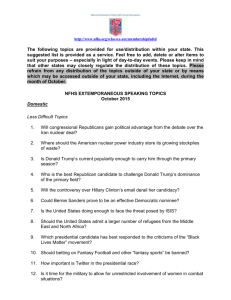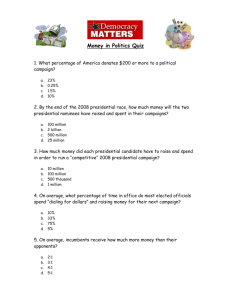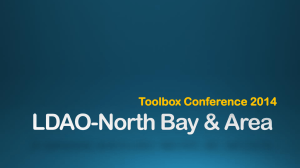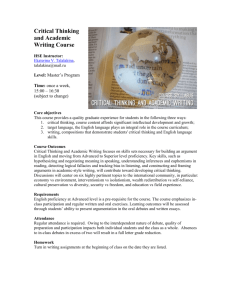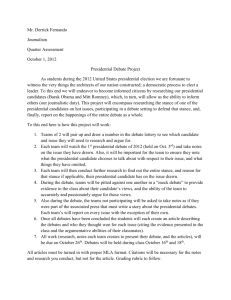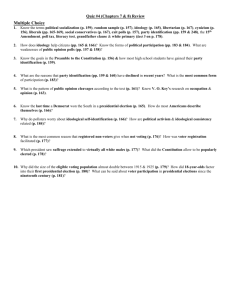comm 401 interpreting strategic discourse #0301
advertisement
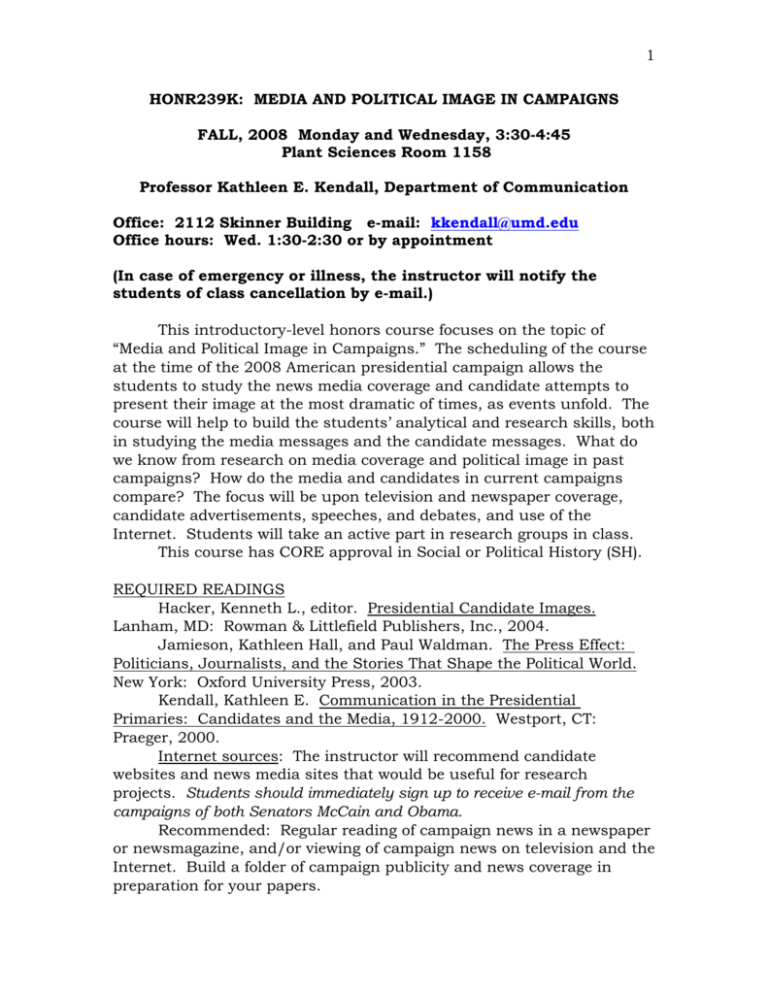
1 HONR239K: MEDIA AND POLITICAL IMAGE IN CAMPAIGNS FALL, 2008 Monday and Wednesday, 3:30-4:45 Plant Sciences Room 1158 Professor Kathleen E. Kendall, Department of Communication Office: 2112 Skinner Building e-mail: kkendall@umd.edu Office hours: Wed. 1:30-2:30 or by appointment (In case of emergency or illness, the instructor will notify the students of class cancellation by e-mail.) This introductory-level honors course focuses on the topic of “Media and Political Image in Campaigns.” The scheduling of the course at the time of the 2008 American presidential campaign allows the students to study the news media coverage and candidate attempts to present their image at the most dramatic of times, as events unfold. The course will help to build the students’ analytical and research skills, both in studying the media messages and the candidate messages. What do we know from research on media coverage and political image in past campaigns? How do the media and candidates in current campaigns compare? The focus will be upon television and newspaper coverage, candidate advertisements, speeches, and debates, and use of the Internet. Students will take an active part in research groups in class. This course has CORE approval in Social or Political History (SH). REQUIRED READINGS Hacker, Kenneth L., editor. Presidential Candidate Images. Lanham, MD: Rowman & Littlefield Publishers, Inc., 2004. Jamieson, Kathleen Hall, and Paul Waldman. The Press Effect: Politicians, Journalists, and the Stories That Shape the Political World. New York: Oxford University Press, 2003. Kendall, Kathleen E. Communication in the Presidential Primaries: Candidates and the Media, 1912-2000. Westport, CT: Praeger, 2000. Internet sources: The instructor will recommend candidate websites and news media sites that would be useful for research projects. Students should immediately sign up to receive e-mail from the campaigns of both Senators McCain and Obama. Recommended: Regular reading of campaign news in a newspaper or newsmagazine, and/or viewing of campaign news on television and the Internet. Build a folder of campaign publicity and news coverage in preparation for your papers. 2 Students in this course will be evaluated based upon their contributions to class discussions, short weekly quizzes based on the readings and the ongoing campaign, two tests, and two papers. The topic of both papers is: “An Analysis of the Political Image of ------“ (name of 2008 presidential candidate), comparing the construction of political image by an individual candidate with the media construction of that candidate. Students studying the same candidate will meet in small research groups in class at several points during the semester to share ideas and compare notes and materials about their projects. Going to hear a candidate in person: It is likely that presidential candidates and/or their surrogates will come to the University of Maryland campus or nearby areas to appeal for votes. Please let the instructor know if you hear of such visits, and she will announce them in class. Every student should plan on attending at least one such event in person. One of the quiz grades (Quiz #8) will be based on this assignment. (Attend the event and send Dr. Kendall a one-to-two paragraph report and evaluation of the candidate’s efforts to persuade the audience.) Viewing the presidential debates: The presidential debates play an important role in the campaign. Save these dates to watch them: Fri. Sept. 26, Thurs. Oct. 2 (VP debate), Tues. Oct. 7, and Wed. Oct. 15. All will be held 9:00-10:30 PM. (There may be a chance to watch them with hundreds of other students, in an exciting research project called DebateWatch.) Course Calendar Sept. 3 Course introduction. Assignments: In the next 2 weeks, students should immerse themselves in the events and news of the presidential campaign. All should watch the McCain Acceptance Address Thurs. night, Sept. 4, and the Time forum on national service (both candidates will speak) of Thurs. Sept. 11—these events will be discussed in class, with 100% participation. At the end of the two weeks, on Sept. 17, be prepared to answer questions about (1) the basic facts about the candidates, (2) the main issues they are stressing, (3) their standing in the polls, and (4) the main news stories about the campaign in that period. Sept. 8 Course introduction. Discussion of basic communication principles, and campaign events. 3 Sept. 10 Lecture on terms in course title: “media,” “political,” “image,” and “campaign.” Group work: discuss observations of McCain Acceptance Address. Sept. 15 Lecture on public speaking and political image. Discussion of Time forum of presidential candidates. Sept. 17 Quiz (in class) on (1) the basic facts about the candidates, (2) the main issues they are stressing, (3) their standing in the polls, and (4) the main news stories about the campaign in Sept. 3-17 period. Sept. 22 Readings due: Hacker, Intro and Ch. 4; Kendall, Ch. 1, Jamieson and Waldman, Ch. 1. View video: “Primaries: Defining the Battle in New Hampshire.” Questions for discussion: How have these readings and video expanded your understanding of (a) the media, (b) political image, and (c) presidential campaigns? Sept. 24 Readings due: Kendall, Ch. 3, Hacker Ch. 7. Topic: Debates. View excerpts of first Kennedy-Nixon debate. Prepare for analysis of the first presidential debate, Fri. Sept. 26, 9-10:30 PM. Sept. 29 Quiz #2 (in class): Who was most successful in developing positive image traits in the first 2008 presidential debate, and why? In writing your answer, consider your knowledge of research on earlier debates. Topic of lecture and discussion: Debates. Oct. 1 Readings due: Kendall, Ch. 6. Topic: Media in the Presidential Campaign. Continue discussion of debates, with focus on media coverage of debates. Prepare for vice presidential debate, Thurs. Oct. 2. Oct. 6 Quiz #3 (in class): Who benefited most from media coverage of the vice presidential debate of Oct. 2? In writing your answer, consider your knowledge of research on earlier debates. Readings due: Jamieson and Waldman, Ch. 2. Topic of lecture and discussion: Media in the Presidential Campaign. Oct. 8 Readings due: Hacker, Ch. 1. Topic: Multiple perspectives of candidate image. 4 Oct. 13 Test #1 (essays and definitions). Covers lectures, videos, readings, presentations, and presidential campaign developments, Sept. 3-Oct. 12, 2008. Oct. 15 Readings due: Hacker, Chapter 8, “Interpersonal Communication Styles of Political Candidates.” Discuss this topic in relation to 2008 presidential campaign. (Reminder: Debate #3 tonight) Oct. 20 Looking back: Discussion and evaluation of 2008 debates. Oct. 22 Short paper and outline due (total of 2-3 pages) in which you show what you plan to do in Paper #1. Oct. 27 Individual appointments about Paper #1 with Dr. Kendall during class time. Oct. 29 Individual appointments about Paper #1 with Dr. Kendall during class time. Nov. 3 Paper #1 due. (10-page paper, including sources, on “An Analysis of the Political Image of ------“ (name of 2008 presidential primary candidate), comparing the construction of political image by the candidate with the way the media portrayed the candidate. Lecture topic: Political advertising. See video: Historical political advertising. Nov. 5 Readings due: Kendall, Ch. 4. Topic: Political Advertising. Discuss election results. Nov. 10 Quiz #4: Political advertising. Readings due: Hacker, Ch. 6. Topic: Political Advertising. Nov. 12 Readings due: Hacker, Ch. 8. Topic: Political image and advertising. Nov. 17 Readings due: Jamieson and Waldman, Ch. 3. Topic: Media Shaping of the News. Nov. 19 Quiz #5. Topic: Media Shaping of the News. Readings due: Jamieson and Waldman, Ch. 5. Nov. 24 Professor attending NCA convention. Assignment to be announced for Nov. 24 and Nov. 26. 5 Nov. 26 Assignment to be announced. Dec. 1 News. Readings to be announced on topic: Media Shaping of the Dec. 3 Test #2 (essays and definitions) Covers course content and presidential campaign developments since Test #1. Dec. 8 Topic: The Internet: Strengths and Weaknesses of Political News Sources. Group presentations serve as Quiz #6. Dec. 10 Topic: The Internet: Strengths and Weaknesses of Political News Sources. Group presentations serve as Quiz #6. Quiz #7 – See p. 2, syllabus, “Going to Hear a Candidate in Person” – due during the campaign Paper #2 is due at the scheduled time of the final examination for this course, Wed. Dec. 17, 1:30-3:30 PM, in Professor Kendall’s office, Skinner 2112. (There is no final examination.) Bring the paper to Dr. Kendall’s office, Skinner 2112. (Please bring a self-addressed, stamped envelope if you would like to have the paper returned to you.) Grading: Quizzes: 20% Tests 1 and 2: 30% Paper #1 and Paper #2: 40% Class participation: 10% Papers #1 and 2, further explanation: In these papers--both on the same subject but due midway through the course and then at the end of the course--you will be (a) describing the efforts of a presidential candidate to shape his or her image in a certain way, though speeches, debates, ads, websites, interviews, and other means. You will also be (b) describing the way the media (select specific media for focus) present the candidate. (c) Compare these two different evaluations of the candidate (How are they alike? Different?). 6 Finally—and this is where you really have a chance to show what a good analyst you are becoming--you will (d) discuss how your study of media and image in political campaigns helps you to understand this process, and put it in perspective. Academic Accommodations: If you have a documented disability, you should contact Disability Support Services, 0126 Shoemaker Hall. Each semester students with documented disabilities should apply to DSS for accommodation request forms which you can provide to your professors as proof of your eligibility for accommodations. The rules for eligibility and the types of accommodations a student may request can be reviewed on the DSS web site at http://www.counseling.umd.edu/DSS/receiving_serv.html Religious Observances: The University System of Maryland policy provides that students should not be penalized because of observances of their religious beliefs, and that students shall be given an opportunity, whenever feasible, to make up within a reasonable time any academic assignment that is missed due to individual participation in religious observances. It is the responsibility of the student to inform the instructor of any intended absences for religious observances in advance. Notice should be provided as soon as possible but no later than the end of the schedule adjustment period. Faculty should further remind students that prior notification is especially important in connection with final exams, since failure to reschedule a final exam before the conclusion of the final examination period may result in loss of credits during the semester. The problem is especially likely to arise when final exams are scheduled on Saturdays. Academic integrity: The University of Maryland has a nationally recognized Code of Academic Integrity, administered by the Student Honor Council. This Code sets standards for academic integrity at Maryland for all undergraduate and graduate students. As a student you are responsible for upholding these standards for this course. It is very important for you to be aware of the consequences of cheating, fabrication, facilitation, and plagiarism. For more information on the Code of Academic integrity or the Student Honor Council, please visit http://www.studenthonorcouncil.umd.edu/whatis.html The University of Maryland is one of a small number o universities with a student-administered Honors Code and an Honors Pledge, available on the web at http://www.jpo.umd.edu/aca/honorpledge.html The code prohibits students from cheating on exams, plagiarizing papers, submitting the same paper for credit in two courses without 7 authorization, buying papers, submitting fraudulent documents, and forging signatures. The University Senate encourages instructors to ask students to write the following signed statement on each examination or assignment: “I pledge on my honor that I have not given or received any unauthorized assistance on this examination (or assignment).” -end-
